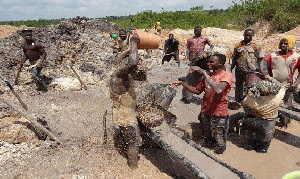“Every mineral in its natural state in, under or upon land in Ghana, rivers, streams, water-courses throughout the country, the exclusive economic zone and an area covered by the territorial sea or continental shelf is the property of the Republic and is vested in the President in trust for the people of Ghana (Minerals Act 2006).”
There is no gainsaying the fact that the wanton despoliation of our mineral resources and the unpardonable destruction of lands and water bodies by the recalcitrant illegal miners were revoltingly outrageous.
But in spite of the apparent dangers, the men and women who were in charge of affairs back then were wholly oblivious to the seriousness of the depredation and denudation, hence their inexorable refusal to halt the activities of the obstreperous illegal miners.
You may take my word for it dearest reader, the influx of genuine tourists is good for our burgeoning economy. But we should not be timorously opening our arms widely to welcoming personalities who harbour ulterior motives. Indeed, Ghana cannot and must not entertain any remorseless nation wreckers.
Let us face it, in as much as small-scale mining could be seen as poverty alleviation, the way it has been managed in the past, it has never been encouraging. It has remained ill-favoured, so to speak.
Take, for example, in spite of the fact that small-scale mining operation is reserved for only Ghanaians, the sector has been infiltrated by foreign illegal miners. The fact however remains that small-scale mining operation is reserved for only Ghanaians (See: subsections (1) of 1989 small-scale mining laws (PNDCL 218) and (2) of section 75 of the Minerals and Mining Law, 1986 (PNDCL 153) and amended Act 2006(Act 703).
And, subject to the aforementioned laws, no licence for small-scale gold mining operation shall be granted to any person who is not a citizen of Ghana. Of course, any person who without a licence granted by the regulatory bodies and undertakes any small-scale gold mining operation contrary to (subsection 1) of section 1 of small-scale mining law; or acts in contravention of any other provision of small-scale mining law in respect of which an offence has not been prescribed, shall be guilty of an offence and shall on conviction be liable to a fine, or to imprisonment for a term not exceeding 2 years or to both.
But despite the expedient regulatory measures that have been put in place, some greedy and unpatriotic Ghanaians have been abhorrently conniving with the foreign illegal miners to steal our natural resources to the disgust of discerning Ghanaians.
It is absolutely true that some unpatriotic and voracious Ghanaians would often secure plots of land and partner with the foreign illegal miners who have funds to bring in the bulldozers and all the other big equipment.
Even though the small scale mining laws prohibit the use of large explosives, the foreign illegal miners were revoltingly using unstructured methods, and at the same time supplying large explosive, rock crushers and other machines to local miners. How pathetic?
Consequently, the involvement of the obdurate foreign illegal miners has disgustingly changed the dynamics of small-scale mining. The illegal miners have been using bulldozers, pay loaders and extremely heavy machinery. Indeed, the foreign illegal miners have mechanized artisanal mining, and as a result the level of environmental devastation has been really huge.
Given the bizarre circumstances, I predicted some time ago that per the illegal miner’s stubbornness, it would take a massive leadership in order to curb the menace in our countryside.
It was thus refreshing when the forward-thinking, serious and committed President Akufo-Addo pragmatically placed an interim ban on small-scale mining activities. That was, indeed, the quintessence of massive leadership. Akufo-Addo, so to speak, has done what Napoleon could not do. It may turn out to be the greatest achievement in his political career.
In the past, I solemnly ventured and suggested that much as we may not be able to take a cue from the United States of America, who put in place punitive measures with the view to halting the Chinese illegal miner’s invasion in the19th and 20th centuries, we could still put tabs on the illegal mining through other stringent measures.
The story was told painfully, though vividly, that in the mid 1800’s, the Americans were confronted with similar predicament -the invasion of the illegal Chinese miners. In their desperate attempt to halt the seemingly pernicious onslaughts by the incompliant illegal Chinese miners, the American authorities were forced to promulgate draconian immigration laws which targeted the illegal Chinese miners.
Large-scale Chinese immigration began in the mid 1800's due to the California Gold Rush. Despite the flood of Chinese immigrants during that time, their population began to fall drastically because of laws such as the Chinese Exclusion Act and the highly imbalanced male to female ratio.
Miners in the area often used violence to drive the Chinese out of various mines. While impatient gold-seekers would abandon prospective rivers, the Chinese would remain, painstakingly panning through the dust to find bits of gold. As time passed the resentment against the Chinese immigrants in America increased, and eventually, the laws such as Naturalisation Act of 1870 and the Chinese Exclusion Act of 1882 came into force to restrict immigration of Chinese immigrants into the United States of America.
The Naturalisation Act of 1870 restricted immigration into America to only "white persons and persons of African descent, meaning that all Chinese were placed in a different category, a category that placed them as ineligible for citizenship from that time till 1943 (Source: encyclopedia.com).
In addition to stealing our natural resources, the illegal miners are gleefully polluting our sources of drinking water with noxious mercury and cyanide. How bizarre?
“Unlike some other West African countries, Ghana allows mercury use in mining. Mercury is freely available in shops and can be bought with a canister, bottle, or as a ball wrapped in a plastic cling film, and much of it has been brought in by Chinese miners (HRW 2014).”
According to the World Health Organisation (WHO), exposure to mercury – even small amounts – may cause serious health problems, and is a threat to the development of the child in utero and early in life.
And what is more, WHO insists that mercury may have toxic effects on the nervous, digestive and immune systems, and on lungs, kidneys, skin and eyes. Worryingly, however, mercury is considered by WHO as one of the top ten chemicals or groups of chemicals of major public health concern.
WHO explains that people are mainly exposed to methylmercury, an organic compound, when they eat fish and shellfish that contain the compound. Moreover, WHO suggests that the primary health effect of methylmercury is impaired neurological development.
Given the extreme dangers associated with illegal mining, it is, indeed, a step in the right direction for President Akufo-Addo to halt the illegal miners, many of whom are said to have been using noxious mercury in their mining activities. However, it would be extremely helpful if we could go a step further and outlaw the use of mephitic mercury in artisanal mining.
Let us face it, though, better data and policies are needed to get the sector back on track. So, going forward, the 1989 small-scale mining law has to be amended. The amendments must make it unlawful for any Ghanaian to transfer small-scale mining licences to their foreign minions, and, must also prohibit allocation of mining lands to the illegal miners.
Opinions of Tuesday, 23 January 2018
Columnist: Kwaku Badu














